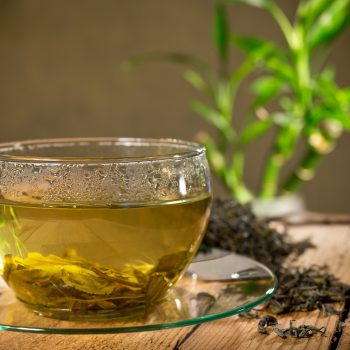
In this guide you’re going to get 10 easy ways for brewing fresh loose leaf tea when you don’t have a strainer or infuser to hand.
Use these simple tips and tricks for making the most of everyday household objects to brew delicious loose leaf.
1. The Double Cup Method
The double cup method is simple and something everyone can do at home. All you need is two mugs, a cup and you’re ready to strain.
Use one mug to pour in the loose leaf and hot water. Once brewed, make sure your other mug is clean and ready to use.
Place the cup partially in the mug as you’re pouring the tea into the clean mug. It will act as a barrier to stop the loose leaf from transferring into the mug.
This method can be messy if you’re not careful, so you may want to practice the first few times over the sink. Also be careful not to burn your hands with hot water.
2. The Traditional Method – a Gaiwan
The traditional method of brewing tea in China has been around for centuries. It is a small bowl with a lid that is called a Gaiwan.
You are currently viewing a placeholder content from Default. To access the actual content, click the button below. Please note that doing so will share data with third-party providers.
More InformationIf you have a Gaiwan at home, this is a simple way to brew loose leaf without a strainer. If you don’t have a Gaiwan, you can still use this method with other items you have at home.
Simply brew the tea in a mug as your normally would with hot water. Once brewed, use a small plate to block the leaves and pour into a serving glass.
3. How to Use a Coffee Filter to Brew Tea
If you’re a fresh coffee lover, you probably have some spare paper filters lying around in your kitchen.
These are perfect for loose leaf brewing. It’s a simple method that requires little clean up afterwards as you can discard of the used paper filter with the leaves inside.
It uses the same method as you would use for fresh coffee. For the best flavour, opt for unbleached filters.
Cleanse the paper with hot water to remove the paper taste. Place in a mug and place the loose leaf in the filter. Then pour hot water in a circular motion over the tea and allow to brew.
Once brewed, remove the filter with the leaves inside and you’re left with a delicious cup of freshly brewed tea.
4. Using Kitchen Roll
This method uses the same idea as the coffee filter approach.
You are currently viewing a placeholder content from Default. To access the actual content, click the button below. Please note that doing so will share data with third-party providers.
More InformationSimply grab a piece of kitchen roll and fold twice into a square. Fold out one pocket and place in your mug. (You might want to cleanse the kitchen roll first to remove any paper taste).
Place the loose leaf in the kitchen roll, pour over hot water and leave to brew. Just like the coffee filter method, remove the paper once brewed and enjoy your cup of fresh loose leaf tea.
5. Sieving the Tea Leaves
As most people have a sieve in their kitchen, this is an easy way to brew when you don’t have an infuser at home.
Brew the loose leaf as your normally would in a cup or mug. Once brewed, grab another mug and place the sieve on top of it. If the sieve is much larger than the mug, you’ll have to keep hold of it when pouring.
Pour the cup with the brewed tea into the clean mug. You will now have a finely filtered cup of fresh tea.
6. Using a Slotted Spoon
If you don’t have a sieve at home, a slotted spoon also works well for this method. Although, it can work better for some types of tea than others depending on how big the slots are.
For example, a fine black tea would might escape through holes that are too big, whereas green whole leaf would be fine. Use your own judgement as to whether this method will work for your loose leaf.
Just brew the tea in a mug and pour into another cup through the slotted spoon once brewed.
7. Using a Fork
If you don’t have a sieve or slotted spoon at home, you must have a fork lying about somewhere.
This method is great for travelling or when you’re on the road as you’ll likely have access to a fork.
It uses the same approach as the slotted spoon. Once the tea is brewed in your mug, carefully pour into another cup using the fork to push back and block the leaves from getting into the mug.
8. Tea Bag Filter Method
As a fresh loose leaf appreciator, you might not have many tea bags lying around. Or, you may be reluctant to use a tea bag for your brewing.
But, trust me, we aren’t using any of the contents, just the bags itself. Andong gives a great demonstration of this method at 1:42 in his video:
You are currently viewing a placeholder content from Default. To access the actual content, click the button below. Please note that doing so will share data with third-party providers.
More InformationCut the bag open and dispose of the contents. Seal one side by folding over and creating a crease. Open up the bag and pour in your loose leaf.
Then, fold in half so both ends meet and secure with a tooth pick of safety pin. Place in your mug or cup, pour in the hot water and allow to brew.
Once brewed, remove and dispose.
9. Tin Foil Infuser
Create your own makeshift metallic infuser with a small sheet of tin foil.
Cut out a square of tin foil which is around 25cm x 25cm (no need to measure this is just a rough guide).
Fold twice into a small square. Using a sharp pointed knife, twist holes into the corner which is closed.
Fold out one pocket and place into your mug. Put in the loose tea, pour in hot water and allow to brew. You might want to give it a stir half way through.
Remove the tin foil infuser and enjoy.
10. Brewing Tea with a French Press
Who knew a coffee making device could double up as an infuser?
Before starting this method, make sure the French press has been thoroughly cleaned to avoid any coffee taste in your tea.
Take out the metal plunger and drop your loose tea into the beaker. Pour in the hot water and allow to brew. Once brewed, put the plunger in the beaker and press down as you would when brewing coffee.
Then simply pour into a mug to enjoy some fresh tea.

